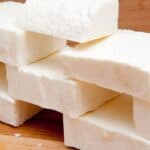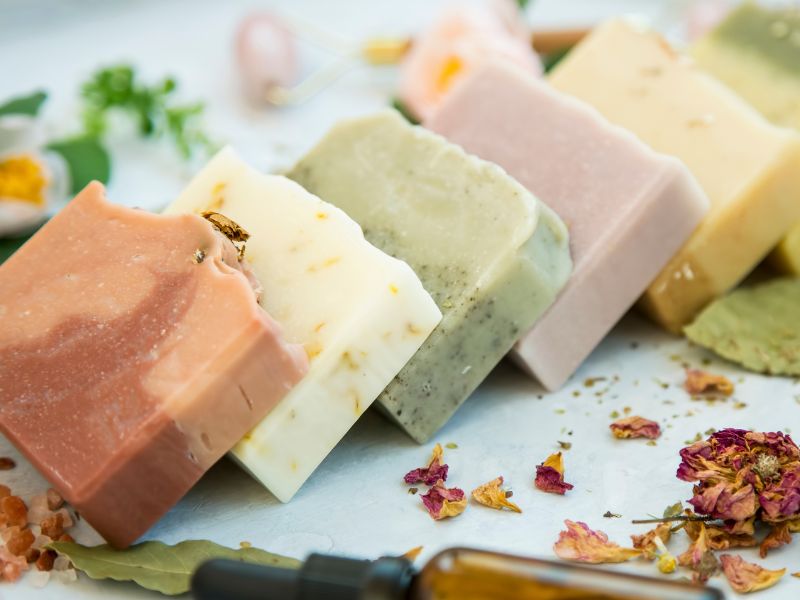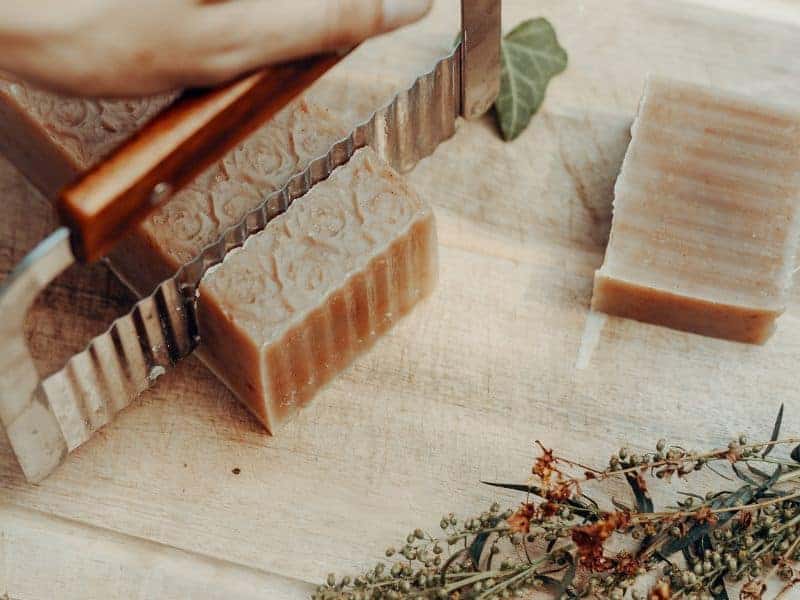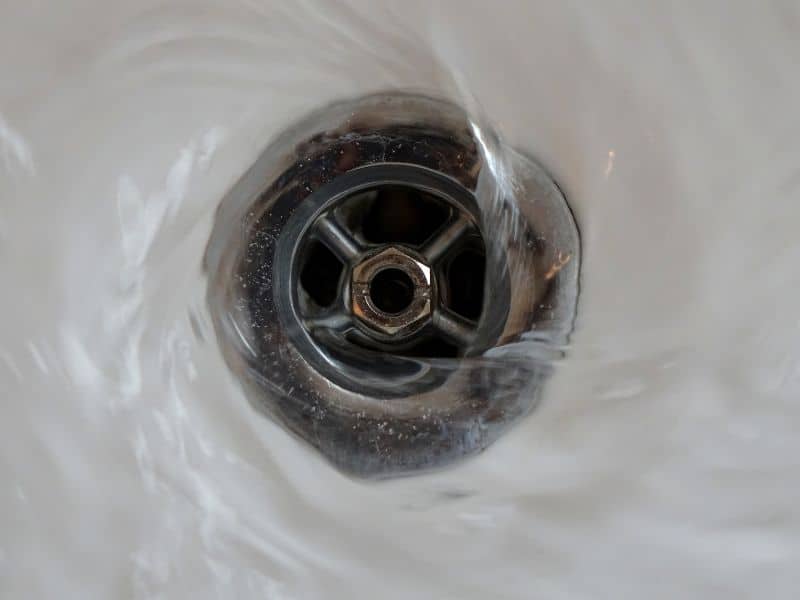Soap is a daily essential for most people, and there are endless options to choose from. However, with concerns about the ingredients in store-bought soap, many people are turning to homemade soap as a natural alternative. But is homemade soap as good as store-bought soap?
Homemade soap is as good as store-bought soap, it can even be better than store-bought soap. Homemade soap is often made with natural ingredients that are gentler on the skin, can be customized to individual needs, and has a lower environmental impact.
Furthermore, homemade soap is often free of preservatives or additional chemicals that can be harsh on the skin. The quality of homemade soap depends largely on the ingredients used and how it is made. Let’s dig a little deeper into the topic of homemade soap vs store-bought soap.
Homemade vs Store-Bought
Quality of Ingredients
Homemade soap is typically made with natural ingredients, such as essential oils, herbs, and natural colorants. These ingredients have several benefits for the skin, including hydration, exfoliation, and soothing properties.
In contrast, store-bought soap often contains synthetic ingredients, which can be harsh on the skin and lead to irritation.
Skin Benefits
Homemade soap is a great choice for people with sensitive skin or those prone to allergic reactions. The natural ingredients used in homemade soap can help soothe and nourish the skin, while also being gentle enough to prevent irritation.
Store-bought soap, on the other hand, may contain additives that can exacerbate skin sensitivities.
Environmental Impact
Homemade soap has a significantly lower environmental impact than store-bought soap. Firstly, homemade soap can be made in small batches, reducing waste and packaging. Additionally, the ingredients used in homemade soap are often sourced locally, which further reduces the carbon footprint.
Store-bought soap, on the other hand, typically comes in plastic packaging and is often transported long distances, contributing to pollution.
Cost-Effectiveness
While the initial investment in making homemade soap may be more expensive than purchasing store-bought soap, in the long run, it can be much more cost-effective. Homemade soap can be made in bulk, reducing the cost per bar.
Additionally, trying to buy the same quality soap in stores that you get with making it at home would be cost-prohibitive. You can make a high-quality bar of soap at home for a few dollars each but if you try to buy the same level of quality in the store, it could be double or even triple the price.
Pros and Cons of Homemade Soap
Pros of Homemade Soap:
Natural ingredients
Homemade soap often uses natural ingredients like essential oils, herbs, and natural colorants, making it a healthier option for the skin.
Customization
Homemade soap allows for customization, enabling the soap maker to cater to specific skin types and preferences.
Eco-friendly
Homemade soap is environmentally friendly, as it produces less waste and uses less packaging.
Cost-effective
Homemade soap can be a cost-effective option, especially for those who make soap in bulk.
Cons of Homemade Soap:
Potential for inconsistencies
As homemade soap is made in small batches, there is the potential for inconsistencies in the quality and texture of the soap.
Longer curing time
Homemade soap requires a longer curing time compared to store-bought soap.
Safety concerns
Making soap involves the use of lye, a caustic substance that can be dangerous if not handled correctly.
Pros and Cons of Store-Bought Soap
Pros of Store-Bought Soap:
Convenience
Store-bought soap is readily available and can be purchased from a variety of retailers.
Consistent quality
Store-bought soap undergoes rigorous testing to ensure consistent quality.
Tested for safety
Store-bought soap undergoes safety testing to ensure it is safe for use.
Wide variety
Store-bought soap offers a wide variety of fragrances and types to choose from.
Cons of Store-Bought Soap:
Synthetic ingredients
Store-bought soap often contains synthetic ingredients, which can be harmful to the skin.
Environmental impact
Store-bought soap can have a negative impact on the environment due to packaging and transportation.
Potential for skin irritation
Store-bought soap may contain ingredients that can cause skin irritation or allergic reactions.
The Hard Truth About Store-Bought Soap
Many store-bought soaps are not just soap; they often contain a variety of synthetic ingredients that may not be beneficial for your skin.
Synthetic Ingredients
These synthetic ingredients can include fragrances, preservatives, and artificial colors, all of which can cause skin irritation, allergic reactions, and other health problems.
Fragrance
One of the most common synthetic ingredients in store-bought soap is fragrance. Fragrances are often made up of a mixture of chemicals that can be irritating to the skin and can cause allergic reactions in some people. These fragrances are often labeled as “parfum” or “fragrance” on ingredient lists, and they can also contain phthalates, which are linked to hormone disruption and other health issues.
Preservatives
Another common synthetic ingredient in store-bought soap is preservatives. Preservatives are added to soap to extend its shelf life and prevent the growth of bacteria and mold. However, many of these preservatives, such as parabens, are linked to hormone disruption and other health issues.
Artificial Colors
Artificial colors are also often added to store-bought soap to make it more visually appealing. These artificial colors can contain heavy metals and other toxins that can be harmful to your health.
Detergents
Moreover, many store-bought soaps contain detergents, which can be harsh and strip the skin of its natural oils, leading to dryness and irritation. These detergents can include sodium lauryl sulfate (SLS) and sodium laureth sulfate (SLES), both of which can cause skin irritation and allergic reactions.
Always Research Soap Before You Buy
It is crucial to research soap products and their ingredients before making a purchase because it directly affects your health and wellbeing. Many commercially produced soaps contain synthetic ingredients that can cause skin irritation, allergic reactions, and other health issues. Some of these chemicals include parabens, phthalates, sulfates, and synthetic fragrances.
By researching soap products and their ingredients before buying, you can make informed decisions about what products to use on your skin. This knowledge can help you avoid products that contain harmful chemicals that can irritate your skin or cause allergic reactions.
Additionally, researching soap products and their ingredients can help you make eco-conscious choices. Many commercially produced soaps contain ingredients that are harmful to the environment, such as microbeads and triclosan. These ingredients can contribute to water pollution and harm aquatic life.
How to Know if You Are Buying High-Quality Soap
It’s important to know what to look for when purchasing soap to ensure that you’re getting a high-quality product that is effective and safe for your skin.
Here are a few tips to help you identify high-quality soap:
Check the Ingredients
One of the easiest ways to tell if a soap is of good quality is to check the ingredient list. Look for natural ingredients such as essential oils, plant-based oils, and butters. Avoid soaps with synthetic fragrances, preservatives, and additives. A high-quality soap should have a short and simple ingredient list that you can easily understand.
Look for Handmade Soaps
Handmade soaps are often of higher quality than mass-produced soaps because they are made in smaller batches and with more attention to detail. Handmade soaps are also more likely to use natural and organic ingredients and can be customized to fit specific skin types and needs.
Consider the Texture
High-quality soap should have a smooth and creamy texture. It should not be too soft or too hard, as both can indicate lower quality. When you pick up the soap, it should feel solid and not break or crumble easily.
Check for Labeling
A high-quality soap should have clear labeling that includes the ingredients, manufacturing date, and expiration date. The labeling should also indicate the soap’s purpose and any special features, such as being vegan, cruelty-free, or organic.
Look for Moisturizing Properties
A good quality soap should not only cleanse the skin but also leave it feeling soft and moisturized. Look for ingredients like shea butter, cocoa butter, and glycerin, which are known to hydrate and nourish the skin.
When shopping for soap, look for natural ingredients, handmade products, smooth texture, clear labeling, and moisturizing properties.
Frequently Asked Questions
Yes, homemade soap is often better for your skin than store-bought soap because it is typically made with natural and organic ingredients that are gentler and more nourishing for your skin.
Yes, store-bought soap can cause skin irritation because it often contains synthetic fragrances, preservatives, and detergents that can be harsh and irritating to the skin.
Yes, natural ingredients in homemade soap are often better for your skin because they are less likely to cause irritation and are more nourishing and moisturizing.
Yes, homemade soap is more eco-friendly than store-bought soap because it can be made with natural and organic ingredients that are better for the environment, and it often comes with less packaging.
Yes, store-bought soap typically has a longer shelf life than homemade soap because it contains synthetic preservatives that can extend its shelf life.
Yes, store-bought soap is more convenient than homemade soap because it can be easily purchased at a store, whereas homemade soap requires time and effort to make.
Homemade soap is better than store-bought soap because of the natural ingredients, reduced carbon footprint, and because homemade soap doesn’t include synthetic ingredients.
Conclusion
In conclusion, handmade soap is often better than store-bought. However, regardless of which one you choose, it is important to look for natural ingredients, smooth texture, clear labeling, and moisturizing properties.
Homemade soap is often better for your skin than store-bought soap because it is typically made with natural and organic ingredients that are gentler and more nourishing. Additionally, homemade soap can be more eco-friendly and have a shorter shelf life than store-bought soap. Ultimately, the choice between homemade or store-bought soap comes down to personal preference.






